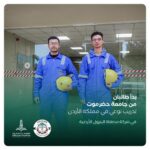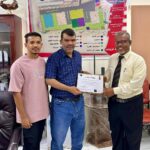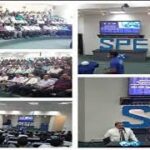Chemical Engineering Department
Overview:
Chemical Engineering Department was established as one of the departments of Engineering and Petroleum Faculty in the academic year 1996–1997, at the beginning of the formation of Engineering and Petroleum Faculty. It was initially combined with Petroleum Engineering Department under the name of Chemical and Petroleum Engineering Department. The department became independent from Petroleum Engineering Department in the academic year 1999–2000.
The specialization of Chemical Engineering at Engineering and Petroleum Faculty – Hadhramout University is the only one of its kind among public and private universities in Yemen Republic.
The department is distinguished by its excellent laboratory capabilities. It has been equipped with advanced laboratories that enable students to visualize how chemical processes operate and interconnect in various chemical plants.
The department also has a computer lab (Multimedia) that contains several specialized engineering programs for conducting design, simulation, and control of industrial chemical processes.
The duration of study in the department is five academic years, after which students are awarded a Bachelor’s degree in Chemical Engineering upon successful completion of all requirements and examinations. The specialized study includes fundamental and applied courses in various types of chemistry (organic, physical, analytical), fluid mechanics, industry and environment, heat and mass transfer, chemical reaction engineering, chemical process design, control processes, safety operations, and the economics of chemical plants. The department emphasizes the use of specialized scientific programs and integrates practical and theoretical aspects through field visits to factories, companies, and institutions, as well as practical training in the department’s labs or in various factories, companies, and institutions.
To enhance the educational and scientific level of the department, it received support in 2010 from the Higher Education Quality Improvement Project (MOHESR, HEQIP) in Yemeni public universities, supervised by the Ministry of Higher Education and Scientific Research and funded by the World Bank. This support was based on the department’s file within the framework of supporting academic accreditation and quality programs in Yemeni public universities, aiming to achieve academic quality and accreditation. This enables graduates to possess a range of knowledge, skills, and professional practices that meet the labor market’s needs, ensuring the quality of outputs and obtaining academic accreditation in the future. Consequently, graduates will be able to compete in the labor market locally, regionally, and internationally, enhancing the faculty’s scientific and social presence.
The primary mission of chemical engineering is to prepare and equip students with diverse scientific and practical skills, training them to think creatively in solving problems and mastering the communication skills necessary for success in their professional lives or when pursuing higher academic degrees.
Mission
Vision
Objectives
- To prepare qualified engineers in the field of chemical engineering and other related fields.
- To establish a sound scientific environment for academic work that promotes continuous development and growth, encouraging openness to contemporary advancements.
- To prepare graduates who are adaptable and flexible in the workplace, capable of performing administrative and leadership roles.
- To establish and strengthen links with local industrial establishments to develop national industrial processes.
- To make the department a prestigious research and consulting center in the field of industrial process engineering.
Deans of Department:
| Name | Academic Title | Period |
| Prof. Osama Abdelhamid Abdelal | Professor | 1996 – 1997 |
| Prof. Mohamed Abdelkader Alsaffar | Professor | 1998 – 1999 |
| Prof. Essam Kamel Saleh | Professor | 2000 – 2001 |
| Assoc. Prof. Hani Ahmed Damaj | Associate Professor | 2001 – 2002 |
| Assoc. Prof. Hamid Nasser Bin Herhara | Associate Professor | 2002 – 2009 |
| Assoc. Prof. Salmeen Saad Alshaamli | Associate Professor | 2009 – 2016 |
| Asst. Prof. Ali Hassan Alshenini | Assistant Professor | 2016 – 2019 |
| Assoc. Prof. Osama Awad Bin Dahman | Associate Professor | 2019 – 2023 |
| Assoc. Prof. Badiea Saeed Omer Babaqi | Associate Professor | 2024 to present |
Faculty Members and Their Specializations in the Department of Chemical Engineering:
| No. | Name | Academic Title | Notes |
| 1 | Assoc. Prof. Badiea Saeed Omer Babaqi | Associate Professor | Dean of Department |
| 2 | Prof. Abdullah Hussein Salem Aljafri | Professor | |
| 3 | Prof. Ahmed Mubarak Ahmed Alsabai | Professor | |
| 4 | Assoc. Prof. Salmeen Saad Obaid Alshaamli | Associate Professor | |
| 5 | Assoc. Prof. Osama Awad Khamis Bin Dahman | Associate Professor | |
| 6 | Assoc. Prof. Abdulhamid Hussein Alsultan | Associate Professor | |
| 7 | Asst. Prof. Abdulraqib Abdulwahab Saeed Alwahbi | Assistant Professor | |
| 8 | Asst. Prof. Omar Yahya Mohamed Bakathir | Assistant Professor | |
| 9 | Asst. Prof. Ali Hassan Ali Alshenini | Assistant Professor | |
| 10 | Asst. Prof. Munir Mohamed Awad Baabad | Assistant Professor | |
| 11 | Asst. Prof. Ali Hussein Ali Alshatri | Assistant Professor | Contracted |
| 12 | Mr. Mohamed Karama Saeed Alsabai | Scholarship student | |
| 13 | Ms. Mona Awad Saleh Alrabaki | Scholarship student | |
| 14 | Mr. Ibrahim Hamada Abdullah Alghurabi | Scholarship student | |
| 15 | Asst. Lec. Ahmed Salem Ahmed Alkalali | Scholarship student | |
| 16 | Asst. Lec. Mohamed Abubakr Salem Alme’ari | Scholarship student | |
| 17 | Asst. Lec. Basem Mohamed Mahfoud Alhouri | Scholarship student | |
| 18 | Ms. Hikma Salem Hassan Bahamid | Master’s Degree | Contracted |
| 19 | Asst. Lec. Hassan Omar Salem Bin Qasim | Bachelor’s Degree | Contracted |
| 20 | Asst. Lec. Fatima Eidros Mohamed Alhabshi | Bachelor’s Degree | Contracted |
| 21 | Asst. Lec. Alaa Ibrahim Mohamed Alamari | Bachelor’s Degree | Lab Supervisor – Contracted |
| 22 | Asst. Lec. Fatima Mohamed Saeed Dakik | Bachelor’s Degree | Lab Supervisor – Contracted |
| 23 | Asst. Lec. Heba Mohamed Omar Doman | Bachelor’s Degree | Lab Supervisor – Contracted |
| 24 | Asst. Lec. Nahed Faraj Murjan Bin Hammam | Bachelor’s Degree | Multimedia Lab Supervisor |
Academic Programs
Study Plan – Department of Chemical Engineering
Bachelor’s Program in Chemical Engineering
Elective Courses:
Students are required to complete 12 credit hours selected from the following elective courses:
| Actual | Credit | Code | Course Title | ||
| t | P | T | |||
| 0 | 0 | 3 | 3 | CHE514 | Heterogeneous Reactor Engineering |
| 0 | 0 | 3 | 3 | CHE515 | Introduction to Biochemical Engineering |
| 0 | 0 | 3 | 3 | CHE516 | Water Treatment |
| 0 | 0 | 3 | 3 | CHE517 | Natural Gas Processing |
| 0 | 0 | 3 | 3 | CHE518 | Petrochemical Industries |
| 0 | 0 | 3 | 3 | CHE519 | Extractive Metallurgy |
| 0 | 0 | 3 | 3 | CHE524 | Water Desalination |
| 0 | 0 | 3 | 3 | CHE525 | Wastewater Treatment |
| 0 | 0 | 3 | 3 | CHE526 | Polymer Science and Technology |
| 0 | 0 | 3 | 3 | CHE527 | Chemical Industries |
| 0 | 0 | 3 | 3 | CHE528 | Pharmaceutical Industry |
| 0 | 0 | 3 | 3 | CHE529 | Selected topics in chemical engineering Courses |
First Year – First Semester
| Actual | Credit | Code | Course Title | ||
| t | P | T | |||
| 0 | 0 | 2 | 2 | ARAB 111 | Arabic Language I |
| 0 | 0 | 2 | 2 | ENG 112 | English Language I |
| 0 | 0 | 2 | 2 | ISLAM 113 | Islamic Culture I |
| 0 | 2 | 1 | 2 | CSC 114 | Computer Skills |
| 2 | 0 | 2 | 3 | MATH 115 | Differential Calculus |
| 0 | 2 | 2 | 3 | PHYS 116 | General Physics I |
| 2 | 2 | 2 | 4 | CHEM 117 | General Chemistry I |
| 4 | 6 | 13 | 18 | SUB-TOTAL | |
| 23 | 18 | TOTAL | |||
T: theoretical P: practical t: tutorial
First Year – Second Semester
| Actual | Credit | Code | Course Title | ||
| t | P | T | |||
| 0 | 0 | 2 | 2 | ARAB 121 | Arabic Language II |
| 0 | 0 | 2 | 2 | ENG 122 | English Language II |
| 0 | 0 | 2 | 2 | ISLAM 123 | Islamic Culture II |
| 2 | 0 | 2 | 3 | MATH 124 | Integral Calculus |
| 0 | 2 | 2 | 3 | PHYS 125 | General Physics II |
| 0 | 2 | 2 | 3 | COE 126 | Computer Programming |
| 0 | 2 | 2 | 3 | CHEM 127 | General Chemistry II |
| 2 | 6 | 14 | 18 | SUB-TOTAL | |
| 22 | 18 | TOTAL | |||
T: theoretical P: practical t: tutorial
Second Year – Third Semester
| Actual | Credit | Code | Course Title | ||
| t | P | T | |||
| 2 | 0 | 1 | 2 | CHE 211 | Introduction to Engineering Design |
| 2 | 0 | 2 | 3 | CHE 212 | Introduction to Chemical Engineering |
| 0 | 2 | 3 | 4 | CHEM 213 | Organic Chemistry |
| 2 | 0 | 1 | 2 | GE 214 | Engineering Drawing |
| 0 | 0 | 2 | 2 | ENG 215 | English Language III |
| 2 | 0 | 2 | 3 | MATH 216 | Vectors and Matrices |
| 8 | 2 | 11 | 16 | SUB-TOTAL | |
| 21 | 16 | TOTAL | |||
T: theoretical P: practical t: tutorial
Second Year – Fourth Semester
| Actual | Credit | Code | Course Title | ||
| t | P | T | |||
| 0 | 0 | 2 | 2 | SSS 221 | Communications Skills |
| 2 | 0 | 2 | 3 | CHE 222 | Mass and Energy Balances |
| 0 | 0 | 2 | 2 | ENG 223 | Technical Writing |
| 0 | 2 | 2 | 3 | CHEM 224 | Physical Chemistry Principles |
| 0 | 0 | 2 | 2 | GE 225 | Engineering Management |
| 2 | 0 | 2 | 3 | MATH 226 | Differential Equation |
| 4 | 2 | 12 | 15 | SUB-TOTAL | |
| 18 | 15 | TOTAL | |||
T: theoretical P: practical t: tutorial
Third Year – Fifth Semester
| Actual | Credit | Code | Course Title | ||
| t | P | T | |||
| 2 | 2 | 2 | 4 | CHE 311 | Fluid Mechanics |
| 2 | 0 | 2 | 3 | CHE 312 | Chemical Engineering Thermodynamics I |
| 2 | 0 | 2 | 3 | CE 313 | Statics |
| 2 | 2 | 2 | 4 | CHEM 314 | Analytical Chemistry and Instrumental Analysis |
| 2 | 0 | 2 | 3 | MATH 315 | Engineering Probability and Statistics |
| 10 | 4 | 10 | 17 | SUB-TOTAL | |
| 24 | 17 | TOTAL | |||
T: theoretical P: practical t: tutorial
Third Year – Sixth Semester
| Actual | Credit | Code | Course Title | ||
| t | P | T | |||
| 0 | 0 | 2 | 2 | CHE 321 | Industry and Environment |
| 2 | 2 | 2 | 4 | CHE 322 | Heat Transfer |
| 2 | 0 | 2 | 3 | CHE 323 | Mass Transfer |
| 2 | 0 | 2 | 3 | CHE 324 | Chemical Engineering
Thermodynamics II |
| 2 | 0 | 2 | 3 | MATH 325 | Numerical Methods |
| 8 | 2 | 10 | 15 | SUB-TOTAL | |
| 20 | 15 | TOTAL | |||
T: theoretical P: practical t: tutorial
Fourth Year – Seventh Semester
| Actual | Credit | Code | Course Title | ||
| t | P | T | |||
| 0 | 0 | 2 | 2 | CHE 411 | Principles of Scientific Research |
| 0 | 0 | 3 | 3 | CHE 412 | Fundamentals of Materials Science |
| 2 | 0 | 2 | 3 | CHE 413 | Process Integration and Optimization |
| 2 | 2 | 2 | 4 | CHE 414 | Separation Process I |
| 2 | 2 | 2 | 4 | CHE 415 | Chemical Reaction Engineering |
| 6 | 4 | 11 | 16 | SUB-TOTAL | |
| 21 | 16 | TOTAL | |||
T: theoretical P: practical t: tutorial
Fourth Year – Eighth Semester
| Actual | Credit | Code | Course Title | ||
| t | P | T | |||
| 2 | 2 | 2 | 4 | CHE 421 | Petroleum Refinery |
| 0 | 2 | 2 | 3 | CHE 422 | Computer Applications in
Chemical Engineering |
| 2 | 0 | 2 | 3 | CHE 423 | Chemical Process Design I |
| 2 | 0 | 2 | 3 | CHE 424 | Separation Process II |
| 2 | 2 | 2 | 4 | CHE 425 | Process Control |
| 0 | 90 | 0 | 0 | CHE 426 | Field Training |
| 8 | 6 | 10 | 17 | SUB-TOTAL | |
| 24 | 17 | TOTAL | |||
T: theoretical P: practical t: tutorial
Fifth Year – Ninth Semester
| Actual | Credit | Code | Course Title | ||
| t | P | T | |||
| 2 | 0 | 2 | 3 | CHE 511 | Process Safety |
| 2 | 0 | 2 | 3 | CHE 512 | Chemical Process Design II |
| 4 | 0 | 0 | 2 | CHE 513 | Graduation Project I |
| 0 | 0 | 3 | 3 | CHE 5XX | Elective I |
| 0 | 0 | 3 | 3 | CHE 5XX | Elective II |
| 8 | 0 | 10 | 14 | SUB-TOTAL | |
| 18 | 14 | TOTAL | |||
T: theoretical P: practical t: tutorial
Fifth Year – Tenth Semester
| Actual | Credit | Code | Course Title | ||
| t | P | T | |||
| 0 | 0 | 2 | 2 | CHE 521 | Corrosion Engineering |
| 2 | 0 | 2 | 3 | CHE 522 | Economics of Chemical Plants |
| 6 | 0 | 0 | 3 | CHE 523 | Graduation Project II |
| 0 | 0 | 3 | 3 | CHE 5XX | Elective III |
| 0 | 0 | 3 | 3 | CHE 5XX | Elective IV |
| 8 | 0 | 10 | 14 | SUB-TOTAL | |
| 18 | 14 | TOTAL | |||
T: theoretical P: practical t: tutorial
Students:
The Department currently enrolls over 300 male and female students.
Since its establishment and up to the academic year 2023–2024, a total of 1,056 students have graduated from the department.
Table: Number of Graduates from the Department of Chemical EngineeringFrom Establishment to the Academic Year 2023–2024
| Cohort | Academic Year | Male | Female | Cohort | Academic Year | Male | Female |
| 1 | 2000-2001 | 22 | 0 | 13 | 2012-2013 | 69 | 3 |
| 2 | 2001-2002 | 16 | 0 | 14 | 2013-2014 | 64 | 5 |
| 3 | 2002-2003 | 22 | 1 | 15 | 2014-2015 | 82 | 1 |
| 4 | 2003-2004 | 28 | 0 | 16 | 2015-2016 | 94 | 0 |
| 5 | 2004-2005 | 25 | 1 | 17 | 2016-2017 | 43 | 5 |
| 6 | 2005-2006 | 33 | 0 | 18 | 2017-2018 | 34 | 6 |
| 7 | 2006-2007 | 31 | 1 | 19 | 2018-2019 | 37 | 3 |
| 8 | 2007-2008 | 42 | 0 | 20 | 2019-2020 | 40 | 6 |
| 9 | 2008-2009 | 34 | 1 | 21 | 2020-2021 | 40 | 4 |
| 10 | 2009-2010 | 15 | 3 | 22 | 2021-2022 | 65 | 2 |
| 11 | 2010-2011 | 29 | 4 | 23 | 2022-2023 | 42 | 8 |
| 12 | 2011-2012 | 52 | 1 | 24 | 2023-2024 | 34 | 8 |
| SUB-TOTAL | 349 | 12 | SUB-TOTAL | 644 | 51 | ||
| TOTAL | 1056 | ||||||








